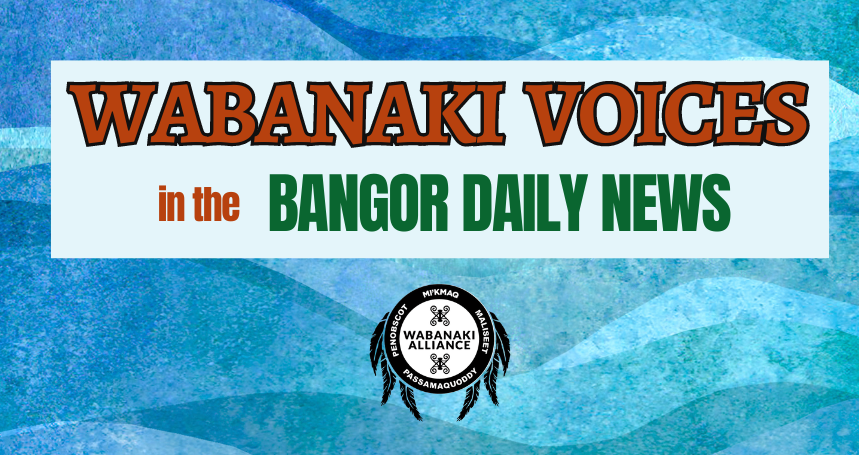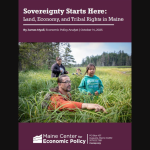The August Wabanaki Voices column was written by Maliseet Ambassador Osihkiyol Crofton-Macdonald, board president of the Wabanki Alliance, and Maulian Bryant, executive director of the alliance and a citizen of the Penobscot Nation. Wabanaki voices is a monthly column in the Bangor Daily News opinion section that shares tribal perspectives. Read all Wabanaki Voices columns here.
The first legislative session of the 132nd Legislature has wrapped up, leaving the Wabanaki Alliance with mixed results and uncertainty.
We successfully defeated two legislative proposals that would have been detrimental to Wabanaki Nations’ interests. These defensive victories are testament to the tireless efforts of our advocates and allies.
However, many of our proactive legislative efforts, aimed at advancing self-determination and economic opportunity, are still in various stages of progression.
Here is a breakdown of where crucial legislation stands.
These bills have passed both chambers but are being held by the governor:
LD 870, An Act Regarding the Membership of The Maine Land Use Planning Commission, aims to adjust the composition of a key planning body, which could impact land use decisions relevant to Wabanaki territories.
LD 1164, An Act to Create Economic Opportunity for The Wabanaki Nations Through Internet Gaming, represents a significant step towards economic diversification and self-sufficiency for our Nations by allowing internet gaming.
These bills have been signed into law by the governor, marking concrete progress in specific areas:
LD 44, An Act to Amend the Laws Pertaining to Elver Fishing, is legislation that directly impacts our traditional and economically vital elver fisheries.
LD 982, An Act to Establish Equal Tax Treatment for The Mi’kmaq Nation, is a crucial step towards achieving financial equity for the Mi’kmaq Nation, addressing a long-standing disparity.
LD 1900, An Act to Bring Parity to The State’s Recognition of The Wabanaki Nations’ Authority to Provide Electric Power Districts and Child Support Enforcement. This law expands the jurisdictional authority of our Nations, bringing us closer to parity with other federally recognized tribes.
LD 1933, Resolve, To Study Pathways For Tribal Law Enforcement Officers To Receive A Waiver For The Maine Criminal Justice Academy Basic Law Enforcement Training Requirement, initiates a study to streamline the process for our tribal law enforcement to receive state recognition, an important step for public safety within our communities.
Also enacted, but opposed by the Wabanaki Alliance:
LD 297, An Act Regarding the Management of Wastewater Treatment Plant Sludge at The State-owned Landfill, addresses an environmental concern with direct implications for the lands and waters surrounding our communities.
These bills were carried over and will be considered in any special or regular session of the 132nd Legislature. They represent significant initiatives that require continued advocacy.
LD 14, An Act to Provide Indigenous Peoples Free Access to State Parks. This bill, if funded, would ensure our people have free access to ancestral lands now designated as state parks.
LD 395, An Act to Restore Access to Federal Laws Beneficial to The Wabanaki Nations, is critical legislation that seeks to undo the restrictive impacts of the 1980 Maine Indian Claims Settlement Act, allowing us to access federal resources available to other tribes nationwide. It also awaits public hearing and work sessions.
LD 785, An Act to Enact the Remaining Recommendations of The Task Force on Changes to The Maine Indian Claims Settlement Implementing Act. This bill would implement recommendations to modernize the outdated Settlement Act. It still needs a public hearing and work sessions.
LD 1054, An Act to Authorize the Penobscot Nation to Use Wild Game Harvested on The Penobscot Indian Territory at Food Venues Located Within the Penobscot Indian Territory, would empower the Penobscot Nation to utilize its traditional food sources for economic and cultural purposes. It still needs a public hearing and work sessions.
LD 1474, An Act to Strengthen the Teaching of Wabanaki Studies in Maine Schools. This vital legislation seeks to ensure that Maine students receive a more complete and accurate understanding of Wabanaki history and culture. If funded, it will proceed to a final vote and then to the governor’s desk.
LD 1851, An Act to Bring Parity Among the Wabanaki Nations Regarding the Generation of Revenues from Gaming. This bill aims to ensure equitable opportunities for all Wabanaki Nations in generating gaming revenues, fostering economic development.
The defeat of LD 958, An Act to Prohibit Eminent Domain on Existing Tribal Trust Lands, highlights the ongoing challenges we face in legislative advocacy. The bill, which would have protected our sacred trust lands from state eminent domain, was vetoed by the governor, and her veto was sustained in the House. This was a significant setback.
If we were to grade this session, “incomplete” would be the most accurate assessment. Many of our initiatives are still in limbo.
The Wabanaki Alliance remains steadfast in its mission. We will continue to engage with the governor’s office, educate legislators, and advocate for our inherent rights. Our pursuit of true self-determination for the Wabanaki Nations is a long-term commitment, and we are prepared for the legislative battles ahead, whenever they may come. We urge our allies and all Mainers who believe in justice and equity to stay engaged and lend their support.





